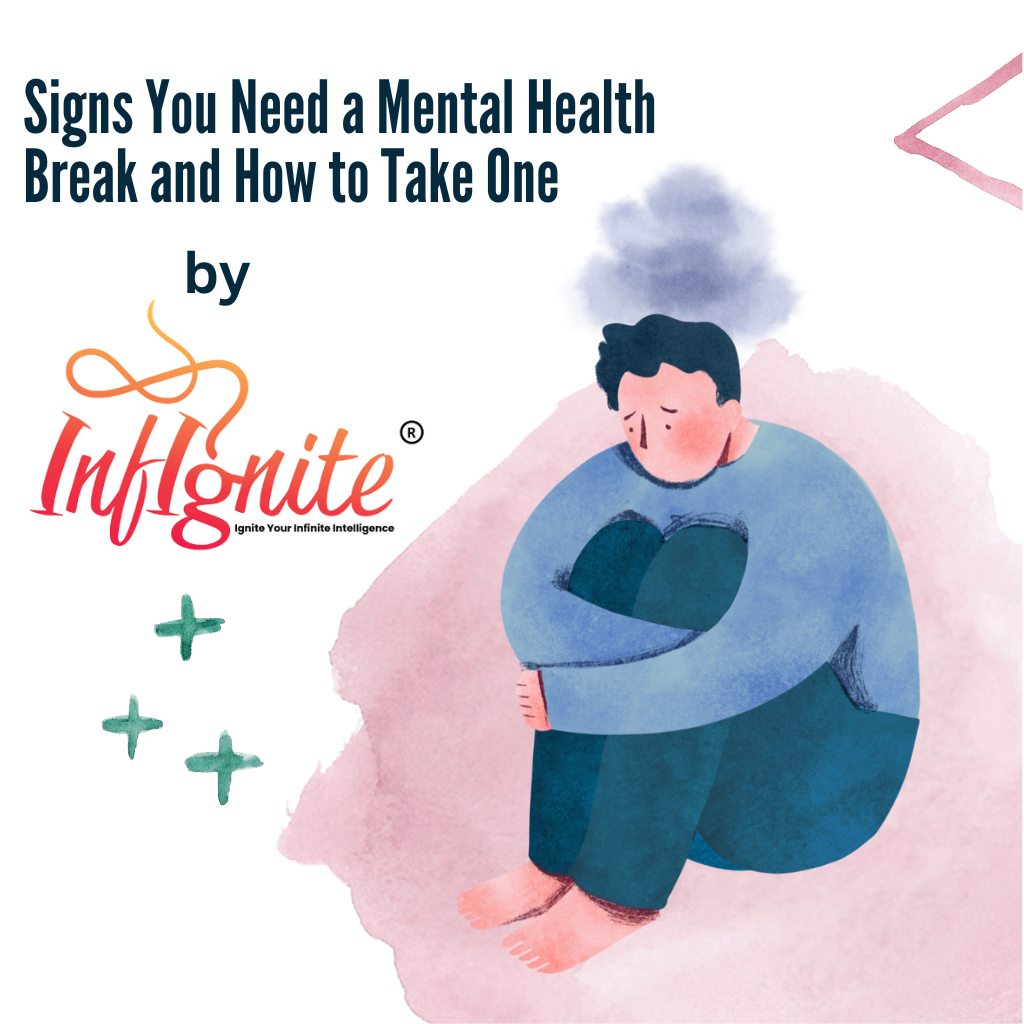In our fast-paced world, many people overlook the signs that their mental health needs attention. Taking a break to prioritize mental well-being is crucial to maintaining balance. Here are some key indicators that you may need a mental health break and tips on how to take one:
Signs You Need a Mental Health Break
- Chronic Fatigue
One of the clearest signs that you need a mental health break is chronic fatigue. Feeling physically and mentally drained despite adequate sleep suggests burnout. This fatigue is more than just tiredness; it’s an overwhelming exhaustion that makes it hard to function and focus. - Increased Irritability
When small issues lead to outsized reactions, it’s a sign that stress is weighing heavily on you. If you find yourself snapping at others or feeling perpetually frustrated, your mental reserves are likely depleted. High irritability can indicate that your mind needs a reset. - Difficulty Concentrating
When your mental energy is stretched thin, it becomes harder to focus on tasks, leading to lower productivity and errors. A lack of concentration, forgetting important details, and feeling scattered are clear indicators of cognitive overload. - Loss of Interest
A common sign of needing a mental break is losing interest in activities that you once enjoyed. If hobbies, work, or social interactions no longer bring you joy, it could signal emotional exhaustion or early stages of depression. - Physical Symptoms
Mental stress often manifests physically. Frequent headaches, digestive issues, muscle tension, or chest pains can be physical responses to unresolved emotional stress. If you notice recurring physical discomfort without a clear medical cause, it might be time to take a break. - Sleep Problems
Both insomnia and oversleeping are red flags that your mental health is out of balance. Sleep is crucial for emotional regulation, and disruptions to your sleep cycle often reflect heightened anxiety or stress. Poor sleep exacerbates stress, leading to a cycle of burnout. - Feelings of Hopelessness or Apathy
If you begin feeling hopeless, detached, or apathetic, it’s important to take it seriously. These emotions are often tied to prolonged stress and can indicate depression or anxiety. Taking a step back to focus on self-care and mental recovery is vital when experiencing these feelings.
How to Take a Mental Health Break
Taking a mental health break doesn’t have to mean completely stepping away from your responsibilities for weeks at a time. There are small, manageable steps you can take to help restore balance.
- Disconnect from Technology
A break from social media, emails, and phone notifications can provide immediate relief from information overload. Use this time to reconnect with yourself without external distractions. - Practice Mindfulness and Meditation
Mindfulness practices can help center your thoughts and reduce mental clutter. Meditation, deep breathing exercises, or simply taking a quiet walk can calm your mind and body. - Take Time Off Work
Sometimes, you need more than a few minutes to recharge. If possible, take a personal day or even a longer period off from work to fully rest and recuperate. Use this time to engage in activities that bring you joy and relaxation. - Engage in Physical Activity
Exercise is a proven stress reliever. Whether it’s a gentle yoga class, a brisk walk, or something more intense, physical activity can help release endorphins and improve your mood. - Prioritize Sleep
Make sleep a priority by setting a consistent bedtime routine. Create a calming pre-sleep ritual, avoid screens before bed, and ensure your sleep environment is conducive to rest. Adequate sleep is critical for mental recovery. - Talk to Someone
Sometimes, talking through your stress with a friend, family member, or therapist can provide perspective and emotional relief. Sharing your burdens helps lighten the load and offers a new way to approach your challenges. - Engage in Creative Outlets
Doing something creative, like drawing, painting, or writing, can be a therapeutic way to release pent-up emotions. Creative activities help the brain relax, process feelings, and break free from daily stressors. - Plan Regular Breaks
Incorporate regular short breaks throughout your day. Even taking 5-10 minutes every hour to step away from work, stretch, or breathe deeply can prevent mental fatigue from building up.
Conclusion
Recognizing the signs that you need a mental health break is crucial for maintaining long-term well-being. Fatigue, irritability, and a lack of focus are all signals that it’s time to step back and take care of yourself. At Infignite, we understand the importance of mental well-being and offer a holistic approach to healing. Through energy healing, psychotherapy, and personalized support, we help individuals release stress, regain balance, and rejuvenate their mental health, ensuring a sustainable and fulfilling life.




